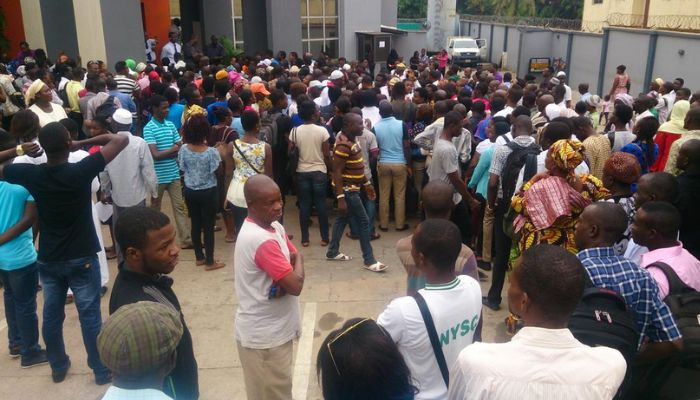Cash Scarcity: Economists urge CBN, banks to allow N100,000 withdrawals over counter

Economists have urged the CBN to identify and address the bottlenecks associated with the cash swap policy, causing uncertainty currently pervading the economic environment.
The experts, who made the appeal in separate interviews in Lagos, said it was necessary to ease tension emanating from the policy’s attendant hardships. They were reacting to the Supreme Court’s adjournment of the suit filed by some state governments, challenging the February 10 deadline by CBN to end the use of old N200, N500 and N1,000.
Johnson Chukwu, the MD of Cowry Asset Management, said the situation was no longer a case of judicial directive or order but about what should be done to relieve the pressure on citizens.
“I have argued repeatedly that CBN can order the commercial banks to pay as much as N100,000 over the counter, and if they do that and people are able to withdraw at least N100,000 per week, I believe the pressure will come down, and people will get some relief,” said Mr Chukwu.
Ndubisi Nwokoma, professor of Financial Economics and the director of the Centre for Economic Policy Analysis and Research, University of Lagos, Akoka, urged the CBN to identify bottlenecks and address them.
“I think CBN should make an effort to identify where the bottlenecks are and address them. They need to enhance the printing of the redesigned naira notes and their effective distribution through deposit money banks,” stated Mr Nwokoma. “The battle over the old notes and the Supreme Court case, in my view, is largely about the 2023 elections and the incidence of vote buying.”
The professor noted that the “battle is less about the current sufferings of the ordinary person and more about the interests of some politicians who have stashed away huge sums of the old notes for use in mobilising for the elections.”
He urged Nigerians to support the CBN policy, insisting that CBN’s position on old notes ceasing to be legal tender after February 10, is reasonable enough for public support, at least to protect the integrity of the 2023 elections.
Akpan Ekpo, a professor of Economics and Public Policy at the University of Uyo, Akwa Ibom, who described the postponement as “unfortunate,” wished the court had delivered judgment on the matter.
“But I think the Supreme Court is the highest court in the land, the Central Bank is not bigger than the Nigerian Constitution, and by this, all government agencies, organs and so on, are supposed to enforce Supreme Court’s order, and everybody has to obey it,” Mr Ekpo explained.
He added, “My concern is that until February 22, the old notes have to be accepted in line with the new ones. That’s my understanding. So, everybody should be patient and wait until February 22.”
Another economic professor, Sherifdeen Tella, at the Economics Department, Olabisi Onabanjo University, Ago-Iwoye, Ogun, believed that the Supreme Court’s failure to punish CBN for defying its order was what was fueling the confusion in the economy.
“The postponement of hearing on the CBN policy may be in order if the court feels it needs time. But failure to punish those flouting its orders, including the CBN, that the old Naira remains acceptable for transactions is fueling the confusion in the economy,” Mr Tella stated. “Or, does anyone need to go to court separately to sue for violation of court order by CBN, banks and even a court in Lagos?”
Uche Uwaleke, a professor of Capital Market at the Nasarawa State University, Keffi, said, “The postponement would only heighten the anxiety and uncertainty currently pervading the economic environment, especially against the backdrop of the fact that the CBN has maintained February 10, as the date the old notes cease to be legal tender.”
The Supreme Court of Nigeria has adjourned the suit on the naira swap policy to February 22 to allow it to consolidate all cases on the matter emanating from nine more states seeking to be joined in the suit. Nine more states have been joined as parties in the suit initially filed by Kaduna, Kogi and Zamfara governments challenging the legality of the Naira swap policy of the federal government.
In a ruling on Wednesday, a seven-member panel led by Justice John Okoro, the Supreme Court joined the attorneys general of Katsina, Lagos, Ondo, Ogun, Ekiti, Cross River and Sokoto as co-plaintiffs.
The attorneys general of Edo and Bayelsa were joined as co-respondents.
The court has, however, fixed the hearing of the case to February 22. Consequently, the court ordered the original plaintiffs and the respondents, the attorney general of the federation, to amend the processes already filed to reflect the new parties.
(NAN)
We have recently deactivated our website's comment provider in favour of other channels of distribution and commentary. We encourage you to join the conversation on our stories via our Facebook, Twitter and other social media pages.
More from Peoples Gazette

Politics
Katsina youths pledge to deliver over 2 million votes to Atiku
“Katsina State is Atiku’s political base because it is his second home.”

NationWide
Runway Overshoot: Dana plans refunds for customers after FG orders suspension of operations
The airline said it was processing refunds for affected flights over the next one month.

Education
Argentines protest budget cuts to public universities
The protestors are being joined by professors and students with their union leaders.

Sport
EPL: Everton hand Liverpool major upset in title race; Bruno Fernandes’ brace helps Man United return to winning ways
If City win the two games, they will go top of the table.

Heading 3
FRSC collaborates with judiciary for speedy trial of drivers involved in road crashes
“All drivers and vehicle owners who caused crashes on the roads would definitely face the wrath of the law.”

Africa
Tanzania shuts down five hydro stations to reduce excess power on national grid
This is the first time the country will be shutting its hydroelectric stations over excess production.









